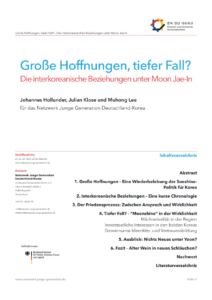Projekt Beschreibung
Zweites Perspective des Netzwerks Junge Generation Deutschland-Korea
Download:
Abstract
Die Präsidentschaft von Moon Jae-In (2017-2022) hat weltweit große Hoffnungen auf eine Annäherung der beiden koreanischen Staaten geweckt. Dieses Papier des Netzwerk Junge Generation Deutschland Korea analysiert, warum die Regierung diese Erwartungen nicht erfüllen konnte, obwohl die Regierungszeit mit mehreren Gipfeltreffen zunächst vielversprechend begann. Die Autoren argumentieren, dass die Mächterivalität in der Region, zuwiderlaufende Interessen innerstaatlicher Akteure sowie nicht zuletzt ein fehlendes gemeinsames Verständnis eines Friedensbegriffes dazu geführt haben, ein Fortschreiten des Annäherungsprozesses zu verhindern. Im letzten Teil des Papiers wird ein Ausblick auf die Regierung von Moon-Nachfolger Yoon Suk-Yeol gegeben.
지난 2017년, 대한민국 제19대 대통령 문재인의 취임은 전세계에 남북한 양국사이의 화해와 협력에 대한 희망을 일깨웠습니다. 하지만 문재인 전 대통령 임기초반의 수 차례에 걸친 여러 정상회담개최에도 불구하고, 문재인 정권의 대북정책은 최종적으로 많은 이들의 기대를 채우지 못하였고, 이 페이퍼는 그에 대한 배경과 원인에 대해 분석합니다. 본 고의 저자들은 화해협력과정이 진전될 수 없었던 원인으로 크게 동아시아 지역의 패권경쟁, 국내행위주체들 간의 상호이해관계 충돌, 그리고 마지막으로 평화개념에 대한 양국의 공통된 이해결여를 꼽았습니다. 또한 마지막에는 윤석열 차기정부의 대북정책에 대한 전망도 살펴봅니다.
Moon Jae-In’s presidency (2017-2022) raised high hopes worldwide for a rapprochement between the two Korean states. His policies were in the tradition of liberal predecessors, particularly Kim Dae-Jung’s Sunshine Policy, and were guided by three principles: “peace first,” denuclearization of the Korean Peninsula, and refraining from regime change in North Korea. The goal of these principles was to achieve a “peace regime.” Despite tireless efforts and small advances, power rivalries in the region, conflicting interests of domestic political actors, and, not least, a lack of common understanding of a concept of peace led to impediments to the rapprochement process. The Moon administration acted in a complex environment with factors that were partly beyond its control. While some factors were particularly favorable, such as parliamentary majorities, other factors were distinctly unfavorable, such as U.S. relations with China and North Korea. Coupled, these factors have rather hindered, or have at least limited, the Moon administration’s room for maneuver. It is questionable that relations will improve significantly under the newly elected government of Moon’s successor, Yoon Suk-Yeol. As a matter of fact, recent developments appear to indicate the opposite.



